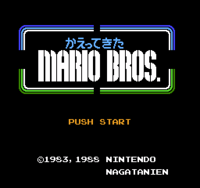Mario Bros. have returned: Difference between revisions
No edit summary |
Reddragon19k (talk | contribs) |
||
| Line 1: | Line 1: | ||
{{rewrite-expand}} | {{rewrite-expand}} | ||
[[image:Kaettekita_Mario_Bros_Title.png|right|thumb|The title screen.]] | [[image:Kaettekita_Mario_Bros_Title.png|right|thumb|The title screen.]] | ||
'''''Kaette Kita Mario Bros.''''' (commonly known in English-speaking countries as '''''Return of Mario Bros.''''' and '''''Mario Bros. Returns''''') is a game for the [[Famicom Disk System]] released on November 30, 1988. The game was released only in Japan.<ref>[http://www.gamespot.com/famicomds/action/kaettekitamariobrothers/index.html GameSpot] Retrieved November 14, 2010</ref>. It is basically | '''''Kaette Kita Mario Bros.''''' (commonly known in English-speaking countries as '''''Return of Mario Bros.''''' and '''''Mario Bros. Returns''''') is a game for the [[Famicom Disk System]] released on November 30, 1988. The game was released only in Japan.<ref>[http://www.gamespot.com/famicomds/action/kaettekitamariobrothers/index.html GameSpot] Retrieved November 14, 2010</ref>. It is basically an updated version of ''[[Mario Bros. (game)|Mario Bros.]]'' | ||
==Game Modes== | ==Game Modes== | ||
Revision as of 07:26, July 12, 2011
It has been requested that this article be rewritten and expanded to include more information.
Kaette Kita Mario Bros. (commonly known in English-speaking countries as Return of Mario Bros. and Mario Bros. Returns) is a game for the Famicom Disk System released on November 30, 1988. The game was released only in Japan.[1]. It is basically an updated version of Mario Bros.
Game Modes
The game has several modes that can be accessed from the main menu.
Original Mario Bros.
This mode plays, for the most part, similarly to the Mario Bros. game that was released to arcades. However, there are several differences.
- Some new levels were added.
- Mario and Luigi can now change direction in mid-air (much like modern remakes).
- The graphics and music were improved somewhat.
- High scores can now be saved.
- Advertisements appeared between levels. Some were for upcoming Mario games, such as Super Mario Bros. 3. Others were for the Japanese food company Nagatanien, who sponsored this game.
- There is also a two-player version of this mode, in which both players are active at the same time.
Nagatanien World
This mode is similar to Original Mario Bros., but two additional features are active:
- After losing all lives and receiving a game over, players will be given the chance to play a Slot Machine Mini-Game. Should they get a match, they will be allowed to continue their game without the score and phase counters resetting. However, this area can only be visited once per game.
- Nagatanien (永谷園) - 4 extra lives
- Three matches- 2 extra lives
- Two matches - 1 extra life
- After reaching 100,000 points, players are given promotional codes that can be mailed in to be entered in a drawing for Mario playing cards. At 200,000 points, players are given another code for a copy of Super Mario Bros 3. All players who send in codes receive a free Mario keyring.
This promotion was active from November 30, 1988 to May 31, 1989.
Name Registration
Players one and two may register their name, age, and gender. These are used when a high score is broken and to refer to players with honorifics appropriate for their gender.
Notices
In this mode, a Shellcreeper explains the promotional features of Nagatanien World.
References
<br=clear all>
